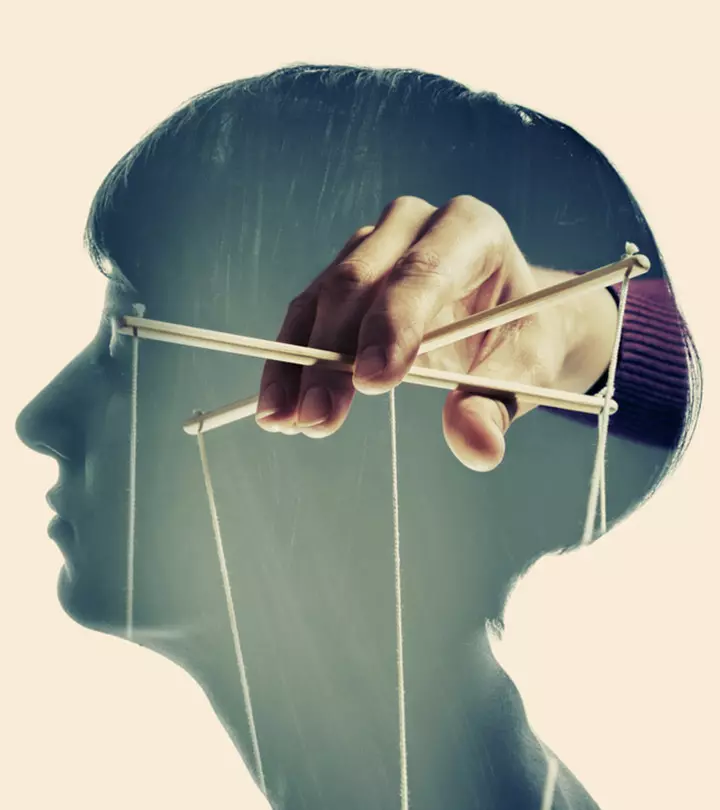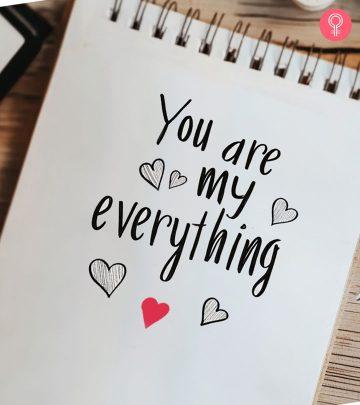21 Signs Of Emotional Abuse In A Relationship & Tips To Heal
Watch out for the red flags to identify the patterns and know when to move on.

Image: Shutterstock
Are you in a relationship that leaves you confused, lonely, afraid, and scared? If yes, you might not yet be aware that you are in an emotionally abusive relationship. Emotional abuse is often stealthy and different from physical abuse. The signs of emotional abuse are not so obvious or apparent. This is why people experiencing this form of abuse take a long time to realize what is happening to them in the relationship.
Emotional abuse commonly occurs in a romantic relationship, but it can also happen between friends, family members, colleagues. As already said, such abuse is toned down and difficult to recognize. In this article, we will discuss indicators of emotional abuse and how one removes themself from such abuse.
In This Article
What Is Emotional Abuse?

Emotional abuse is characterized by a person behaving in a way to control, intimidate, or scare someone else. An emotionally abusive relationship often originates from a power imbalance.
It may take place in the forms of yelling, bullying, threatening, ridiculing, isolating, and gaslightingi A form of manipulation or abuse intended to gain control over an individual by creating self-doubt, confusion, and dependency on the abuser. , among other ways of emotional manipulation. Even though emotional abuse is non-physical, it is often a precursor to physical abuse or domestic violence.
Emotional abuse is often very subtle and easy to miss in the initial stages. The person being abused may not even realize that their partner is manipulating them and may develop psychological trauma, including chronic depression, anxiety, or post-traumatic stress disorder.
Emotionally abusive behavior is perpetuated to subdue, control, punish, or isolate another person by humiliating them or scaring them, and it targets the emotional and psychological well-being of the victim (1).
While emotional abuse is most common in romantic and sexual relationships, it can take place in any kind of personal or professional relationship. These include:
- Spouses/partners
- Parents and children
- Siblings
- Caretaker and patient
- Business partners
- Co-workers
- Friends

 Quick Tip
Quick TipSince emotional abuse is often insidious, it is easy to miss the early signs. If you suspect you are being emotionally manipulated by someone you love, look out for the signs listed in the next section.
Key Takeaways
- Emotional abuse may stem from power imbalance and manifest as threatening, yelling, bullying, gaslighting, ridiculing, isolating, etc. It often leads to physical abuse as well.
- The signs are often subtle and may occur in romantic and other personal or professional relationships.
- It can have many short and long-term effects on the victim.
- Reach out for help when you notice the signs and prioritize your safety and wellbeing.
21 Signs Of An Emotionally Abusive Relationship
Emotionally abusive relationships are often characterized by a power imbalance in the relationship.
While it may be quite subtle in the beginning, emotional abuse does not take long to intensify if not curbed as soon as possible. If you see the behaviors in the following 21 signs in your relationship, you are likely being emotionally abused:
1. Verbal Outbursts/Yelling

Does your partner get angry quickly and yell at you if you do not do what they want? An abusive wife or a husband wants to be in constant control and is likely to lose their temper at the slightest pretext. Yelling is a way of both controlling the person and shaming them for not listening. There are numerous traits of an abusive wife or husband. You should definitely read about them to know whether you are getting emotionally manipulated in a relationship or not.
2. Blatant Lies
If you catch your partner lying often, it is a sign of deep psychological issues.. Abusers are known to be blatant liars and do not shy away from spreading rumors and malicious lies about the people they are abusing.
3. Trivialize Your Problems
While abusive people may pretend to be kind and caring in the initial days of the relationship, their insensitive nature surfaces with time. Abusers do not honor their partner’s emotions, and if the latter wishes to discuss their issues, the abusive partner may trivialize their problem and even criticize them for having the issue.
4. Name-Calling
If your partner calls you stupid, foolish, idiot, loser, pathetic, or any other such derogatory words, they are being verbally abusive and trying to put you down by humiliating you, especially in front of others. This is a major red flag that points toward verbal aggression and emotional abuse.
A blogger shared her personal experience of being in an emotionally abusive relationship and how her partner often used derogatory words for her. She states, “He called me names such as ‘mong’ and ‘drama queen,’ telling me he was joking and I was uptight when I got upset (i).”
5. Frequent Walkouts

While arguments arise in any relationship, people with a healthy mindset discuss their issues and resolve them amicably. However, abusers are more likely to leave a situation rather than talk to their partner and resolve it. By doing this, they shift all the blame on the other person and make them feel guilty.
6. Derogatory Pet Names
Assigning each other sweet pet names is normal in any loving relationship. However, giving someone a derogatory pet name is not a sign of love but emotional abuse. Chubby Pumpkin, Fatso, and Baldy are not terms of endearment. They are meant to attack a person based on their physical attributes.
7. Character Assassination
Character assassination is the deliberate effort to damage the reputation of an individual. To humiliate their partner, abusers often resort to blaming and shaming to make their partner look bad in front of others. They may also go as far as spreading rumors about their partner.
An abuser may post false stories, private photos, or half-truths online to tarnish the image of his/her partner. Social media has become a powerful source for character assassination, amplifying its reach and effect.. An abuser can post a vague but targeted status update like, “Some people love to play the victim, don’t they?”, tagging their partner, leading others to question the victim’s integrity without context. They may have conversations with mutual friends or family, subtly undermining the victim’s character, framing it as concern. They may say things like, “I’m really worried about how unstable they’ve been acting lately”, planting doubt and eroding the victim’s character. This type of psychological damage is deep as victims may be alienated from their social circles, have their self-esteem damaged, and find it difficult to rebuild their reputation.
8. Make Fun Of Your Physical Appearance
Many people have insecurities regarding their physical appearances. Abusive people tend to tap into the other person’s insecurities and comment on their physical appearance in ways that make them feel insulted. Such comments might target someone’s height, weight, skin color, hair, etc.
9. Public Embarrassment
In emotionally abusive relationships, the abusive partner often picks fights in public, yells at you, threatens to expose your secrets, and makes fun of your perceived shortcomings in front of others. If this happens in your relationship, you are being emotionally abused.
10. Jokes And Sarcasm
It is common for abusive people to joke in a hurtful way and trivialize your feelings if you object to them. They may criticize you for not having a sense of humor and even put you down for being a spoilsport. Please remember that people who genuinely care about their partner’s feelings never resort to derogatory jokes.
11. Belittle Your Accomplishments
Abusers are unable to give credit to their partner when credit is due. They thrive on belittling their partner and making them feel insignificant. Your abusive partner might tell you that your accomplishments do not matter much and may even take credit for your achievements.
12. Mock Your Interests
A caring person encourages their partner to take up hobbies and other activities that interest them. However, abusive people do not like to see their partners happily engaged in fun activities with other people and will mock their hobbies and interests.
13. Constantly Trigger You
Once your abuser figures out what hurts and triggers you, they will constantly bring up those topics to push your buttons. Once you are triggered, they will shame you for acting up and losing your cool.
14. Threaten You
Abusers often resort to threats to keep their partner in control. If you are financially dependent on your abusive spouse, they might threaten to abandon you, leaving you alone to raise the children. If you are trying to break up with a controlling partner, they might threaten to kill themselves if you do not stay with them.
15. Monitor Your Whereabouts
While constantly keeping a check on you might seem romantic in the early days of your relationship, it is a control tactic. Monitoring your whereabouts all the time and insisting that you give them a detailed account of where you have been and with whom are subtle methods of curbing your freedom.
16. Take Important Decisions Without Consulting You
Did your spouse just decide to transfer your children to another school without consulting you? Did they sell your family car without asking you first? If your partner never consults you before making a major decision, consider this a red flag.
17. Financial Control
In a healthy relationship, the partners have open discussions about financial issues. However, abusive partners tend to control the finances in emotionally abusive relationships. The victims may even be denied access to bank accounts and forced to beg for money from the abuser.
18. Jealousy
Films and TV shows have romanticized the dangerous idea that being jealous in a relationship means your partner truly loves you. This is not true. If your partner is constantly jealous of the people you spend time with, it probably means they are insecure and controlling.
19. Track Your Social Media
If your partner asks you to share your social media passwords and checks your internet history, emails, texts, and call logs, then it is time to stay alert regarding their true intentions.
20. Unpredictable Behavior
Is your partner’s behavior unpredictable? Do they sometimes shout and yell at you for hours and then shower you with expensive gifts the next day? If your partner’s behavior often leaves you confused about their real intentions, you are probably being emotionally abused.
21. Social Isolation
Abusive people often cut off their victims from their friends and family so that they have no one to turn to in times of need. Social isolation can leave the victim feeling fearful, scared, helpless, and lonely.
 Quick Tip
Quick TipEven if you’re facing just a few of the signs mentioned above, it’s a clear indication of emotional subjugation. These signs also include crucial signs of manipulation that you should not miss, as manipulation in a relationship is also a form of emotional abuse. Let’s now explore the various forms of emotional abuse.
Types Of Emotional Abuse
Emotionally abusive behavior can take many forms. Here are a few types of emotional abuse:
1. Controlling Behavior And Unrealistic Expectations
Controlling behavior is one of the most prominent characteristics of an abusive individual. The abuser controls who their partner meets or spends time with and even monitors their daily activities via regular calls and texts. They might spy on your social media and demand you share your passwords with them.
Instead of treating you like an individual worthy of respect, they treat you like a possession. They do not respect your family and friends and may even prevent you from interacting with them and will be jealous if you spend time with others. They have unrealistic expectations of you and are dissatisfied no matter how hard you try or how much you give. These are prominent signs your partner is controlling you and they are not right and healthy in a relationship.
2. Act Entitled
Emotionally abusive people act entitled. They think that they are superior to you and others and treat you with disrespect. They constantly doubt you and blame you for everything, even for their own mistakes and shortcomings. They mock you and put down your ideas, opinions, values, and thoughts.
Abusive people tell you that you are stupid, useless, and foolish. They talk down to you in a condescending tone and act like they are always right and are smarter than everyone else.
3. Constant Invalidation
Abusive people constantly invalidate others. They undermine and distort your perception of reality and make you doubt yourself. They refuse to acknowledge your feelings and make you explain yourself over and over. They accuse you of being too sensitive or crazy.
They do not accept your opinions and ideas as valid and suggest that you cannot be trusted. They do not listen to any of your valid grievances and accuse you of being selfish. They do not trust you and may accuse you of cheating even when spending healthy time with your family and friends.
4. Emotional Blackmail
Emotional blackmail is a favorite tool employed by abusive people. If you increasingly find yourself fearing your partner’s reactions if you do not comply with their unreasonable demands, you are probably being emotionally blackmailed.
Your partner may manipulate and control you to give in to their demands and make you feel guilty if you don’t. They may use your fears and insecurities to control a situation and exaggerate your flaws to make you feel less competent. They may also withhold affection or give you the silent treatment. Emotional abuse can affect victims in numerous ways, as detailed below.
Selena Soo, a blogger, shared her personal experience of being in an emotionally abusive relationship with her partner. She recounts, “Three months into our relationship, I remember him complaining about how expensive my team was, threatening to leave me if I didn’t let go of certain people. He saw my best friends and industry colleagues as “competitors,” warning me against spending time with them (ii).”
Scroll down to the next section to find out how emotional abuse can continue and manifest a circular pattern.
Cycle Of Emotional Abuse

The cycle of emotional abuse has four stages:
Tension building: The abusive partner starts to show signs of abusive behavior, like irritability, impatience, emotional outbursts, and temper. The non-abusive partner starts becoming anxious and finds ways to reduce the tension.
Incident: The cumulative tension and the abusive partner’s attempt to control the relationship result in abusive incidents, like humiliation, or name-calling.
Reconciliation: After the incident, the abusive partner shows remorse and shame for their behavior and takes steps to compensate for their behavior. They shower the victim with apologies and romantic gestures.
Calm: The abusive partner continues to be attentive but starts justifying their behavior, shifting the blame, and gaslighting you into believing the incident was not that big of a deal. This can feel confusing to the victim.
Effects Of An Emotionally Abusive Relationship

Emotional abuse affects different people in different ways. It is important to recognize that not everyone who has been emotionally abused reacts in the same way. Here are a few effects of being in an emotionally abusive relationship:
- Being emotionally abused can leave one feeling confused, scared, and hopeless.
- People who are emotionally abused tend to feel a deep sense of shame and worthlessness.
- Victims of emotional abuse may experience racing heartbeat, mood swings, and muscle tension.
- Being subjected to emotional abuse may make it difficult for you to concentrate.
- Those who survive long-term emotional abuse may develop post-traumatic stress disorder (PTSD).
- People who have been exposed to long-term emotional abuse may suffer from insomnia, anxiety, and chronic pain as well.
- Victims of emotional abuse may develop self-esteem issues and lose confidence in themselves.
- People who have been emotionally abused develop trust issues and have trouble building close interpersonal relationships.
Being emotionally abused can leave you feeling vulnerable, sad, scared, and lonely. Thankfully, there is hope. Once you realize you are being emotionally abused, there are a few things you can do to protect yourself and make yourself feel safer. Check them out below.
7 Tips For Healing From Emotional Abuse

Emotional abuse can leave you scarred both mentally and physically. You need to remember that the abuse was not your fault. Once you realize you are being emotionally abused and manipulated, you can start taking small steps to protect yourself from further abuse and nurture your wounded inner self. Here are a few good ideas to begin with:
1. Reach Out For Help
Recovery from emotional abuse need not be a lonely process. Turn to trusted friends and family members for emotional support. Join online and offline support groups for people who have experienced psychological trauma and abuse. You can also consult a good therapist for professional advice on emotional recovery.
2. Take Adequate Rest
Experiencing emotional abuse can leave you feeling physically and mentally tired all the time. Give your body adequate care and ensure you sleep well. You can relieve stress before bedtime by listening to soothing music, lighting scented candles, or taking a warm bath.
3. Do Not Engage Your Abuser
If possible, try to discontinue any form of communication with your abuser. If this is not possible, try to minimize your engagement with the abusive person and do not give them the response they are trying to elicit from you. Not engaging the abuser is a powerful way of asserting your boundaries.
4. Get Physically Active
Activities like jogging, swimming, cycling, walking, and dancing reduce anxiety and depression. Going through emotional abuse can affect you in many ways, and regular exercise may help you heal your body and mind. Physical activity can also improve your self-esteem and confidence level (2).
5. Eat Healthy
Make yourself a priority and develop healthy eating habits. A nutrient-rich diet composed of fresh fruits and vegetables, whole grains, legumes, nuts, and seeds gives your body the nourishment it requires and boosts your physical and mental health and well-being (3). Drink plenty of water to keep yourself hydrated. Try to avoid junk or processed foods as much as you can.
6. Get Socially Active
Being subjected to emotional abuse can leave one feeling lonely and isolated. Make healthy social interactions a part of your healing process. Connect with friends and family, attend social gatherings, and maybe sign up for a hobby class to learn painting or pottery.
7. Volunteer
Volunteering your time for a cause close to your heart is a good way of investing your energy and emotions in something meaningful. Do you love animals? Volunteer at a local animal shelter. Do you feel deeply about the elderly? Call up a home for the elderly and spend time with the residents there.
Infographic: Things You Can Do To Heal From Emotional Abuse
Healing from any abuse can be challenging, but it is not impossible. From seeking professional help to indulging in self-care, you can do a wide range of things to give yourself the love you have always deserved. With that in mind, we have rounded up a list of some beneficial activities you can indulge in that can help you deal with the aftermath of emotional abuse in toxic relationships. Check it out in the infographic below!
Some thing wrong with infographic shortcode. please verify shortcode syntax
Relationships are considered a roller coaster of emotions, an emotionally abusive relationship is based on a power imbalance. Your partner can emotionally abuse you by yelling at you, threatening you, or isolating you to manipulate your emotions. Major signs of an emotionally abusive relationship are name-calling, character assassination, jealousy, and social isolation. If you notice any of the above signs, it is better to move out of the toxic relationship at the earliest as an emotionally abusive partner can leave you feeling confused, anxious, and low self-esteem.
Frequently Asked Questions
What is the difference between mental and emotional abuse?
Mental abuse involves a person’s attempt to frighten or isolate you, while emotional abusers make you feel stupid or incompetent. Emotional abuse targets the person’s feelings and emotions to manipulate, while mental abuse concentrates on questioning and influencing their thinking and reality.
What does emotional abuse do to a child’s brain?
Emotional abuse can have long-term effects on a child’s brain. It can affect how the child behaves, controls emotions, and functions in a social setting.
Can emotional abuse cause bipolar disorder?
Yes, emotional abuse can lead to bipolar disorder. A child who has suffered emotional abuse is more likely to develop bipolar disorder (4).
Do people in emotionally abusive relationships recognize the abuse?
Since the abuser is often a spouse or a romantic partner, people often take time to realize they are in an emotionally abusive relationship. However, it is always best not to encourage emotional abuse once you recognize it.
Check out this video to learn about four signs of emotional abuse that you may not even realize are happening to you. Explore the hidden signs that often go unnoticed and learn how to address this harmful behavior.
Personal Experience: Sources
StyleCraze's articles are interwoven with authentic personal narratives that provide depth and resonance to our content. Below are the sources of the personal accounts referenced in this article.
i. Emotional domestic abusehttps://notallwomenarethesame.wordpress.com/2016/03/07/emotional-domestic-abuse/
ii. I was in an emotionally abusive relationship, even as a smart and successful woman
https://selenasoo.medium.com/i-was-in-an-emotionally-abusive-relationship-even-as-a-smart-and-successful-woman-8804ffe58cc9
References
Articles on StyleCraze are backed by verified information from peer-reviewed and academic research papers, reputed organizations, research institutions, and medical associations to ensure accuracy and relevance. Read our editorial policy to learn more.
- Emotional abuse in intimate relationships: The role of gender and age https://pmc.ncbi.nlm.nih.gov/articles/PMC3876290/
- Exercise for Mental Health https://www.ncbi.nlm.nih.gov/pmc/articles/PMC1470658/
- Defining a Healthy Diet: Evidence for the Role of Contemporary Dietary Patterns in Health and Disease https://www.ncbi.nlm.nih.gov/pmc/articles/PMC7071223/
- The Role Of Childhood Trauma In Bipolar Disorders
https://journalbipolardisorders.springeropen.com/articles/10.1186/s40345-015-0042-0 - Emotional abuse in intimate relationships: The role of gender and age
https://www.ncbi.nlm.nih.gov/pmc/articles/PMC3876290/
Read full bio of Sharon Gilchrest O’Neill
Read full bio of Sneha Tete
Read full bio of Madhumati Chowdhury
Read full bio of Sneha Tete

























Community Experiences
Join the conversation and become a part of our empowering community! Share your stories, experiences, and insights to connect with other beauty, lifestyle, and health enthusiasts.